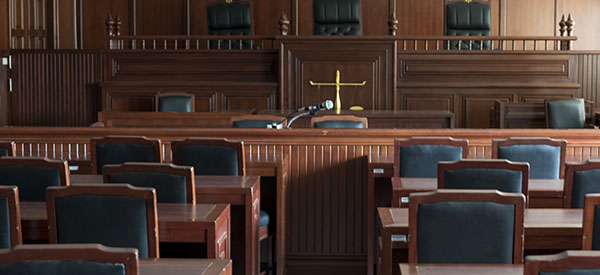
GET A FREE QUOTE
Simply fill out this form and a reputable lawyer in your area will contact you as soon as possible.


Request your quote now!


Simply fill out this form and a reputable lawyer in your area will contact you as soon as possible.


Request your quote now!
Legal procedures are tedious and complex so venturing into the legal system without adequate representation is a very perilous adventure.
From the many legislative provisions applicable to your situation to the trial and the development of hard-hitting arguments, the task of bringing a dispute to its successful conclusion is very demanding. This is why the help of a lawyer is so essential.

Lawyers in Repentigny benefitted from rigorous training and countless years of experience which gives you the confidence to enter a legal battle with high chances of victory. Without a lawyer, you won’t be able to come up with an effective legal strategy to win your case.
The first instinct of any sane person fighting a legal dispute is to go to court for the sake of success. American fictionalized films probably have something to do with this reaction. While not completely wrong, the fact remains that there are methods besides a conventional trial that can help solve your problem. You might even save time and money in the process.
Out-of-court settlement: Hard to envision when events are characterized by bad faith and the parties involved show no willingness to cooperate but an out-of-court settlement can actually be a viable option when egos are cast aside.
Indeed, although relations can be strained, trying to resolve a situation amicably can help avoid paying costly attorney fees, having to submit a request to the court, extrajudicial costs, etc. Above all, it can save time waiting for justice to be done. All without any guarantee of a satisfactory result for anyone!
Civil Trial: Even while praying for peace, sometimes war is inevitable. If this is the case, it will be necessary to present a request to institute proceedings with one of the courts in Quebec that are qualified to hear your case. Simply submitting such a request can be complex; this is why the services of a lawyer are so useful.
For the conduct of the proceedings, a lawyer will act as the representative responsible for making your points, your arguments, and supporting everything on a consistent legal basis. It is highly professional work that is difficult to accomplish without formal legal training.
Negotiation: What differentiates negotiation from an amicable settlement is that it is often conducted by lawyers on both sides of the dispute. Their expertise in resolving disputes makes them well positioned to understand the interests at stake and, therefore, to present offers that are likely to be accepted. In addition, because disputes are often characterized by bad faith, an emotionally disengaged portrayal of the conflict increases the chances of resolution and, at the very least, ensures a more peaceful course of action.
Mediation: The mediation process involves the intervention of a third party responsible for reconciling the opposing interests of the parties. Acting as a go-between, the mediator listens to the claims and arguments of both parties to the conflict and tries to find some common ground. The goal being to get everyone to “put water in their wine”, it is a pledge of good faith to consider mediation as a possible solution.
Arbitration: Opting for the arbitration process is choosing a private form of dispute resolution that is very similar to traditional litigation but without including the many formalities that go with it. The arbitrator in question is given significant decision-making powers in matters of fact and evidence assessment and also in the application of the law.
To give an example, an error of law committed by a trial judge in a traditional trial opens the door to an appeal. This is not the case with dispute arbitration; it is a final process that results in the arbitrator’s decision being final. So what are the advantages of arbitration? The speed of resolution of the matter. The deadlines for rendering a decision are much shorter in arbitration than in a traditional court.
Even when opting for alternative dispute resolution, the help of a lawyer is strongly recommended. Hiring a competent lawyer will save you time, money, and help you win your case.
The terms encompassing legal disputes are sometimes confusing, especially when moving from a criminal to a civil record. Each person has a name and is given the burden of certain responsibilities. This is why it is important to become familiar with the different terms used to designate legal professionals. Here are the different terminologies in civil and criminal matters.

Civil lawsuit: This type of proceeding brings together a plaintiff seeking to be compensated by a defendant for a fault that the latter allegedly committed. Thus, unlike a criminal trial, punishment is not the objective sought, but rather, compensation for the harm suffered.
The plaintiff: A plaintiff is one who submits a request to the court to bring an action against another person, whether natural or legal. While he is responsible for initiating the proceedings, the burden of proving the defendant’s fault to the judge is also on his shoulders.
Defendant: You guessed it, the one who is called the defendant is the one on the other side of the lawsuit. He has the prerogative to demand that proceedings take place in his judicial district which saves him travel. His primary role, however, is to refute the claims of the plaintiff.
The judge: In a civil trial, the judge is the absolute master of the evidence. He uses his own judgment in terms of weighing the facts, the evidence, and the law that will lead to the rendering of a final judgment.
Criminal trial: On the criminal and penal side, the trial puts forward the case against the accused. Although a crime is committed against a person who is described as a victim, it is not the victim who brings charges against his attacker but the state. It is because of the grave and immoral nature of the acts characterized as criminal that the state prosecutes the accused.
The Prosecution: Frequently referred to as the “crown,” the prosecution is actually a lawyer working for the Department of Criminal and Penal Prosecutions (DPCP) seeking to prove the guilt of the accused by all legal means. He will have to demonstrate this guilt beyond a reasonable doubt, a heavy burden and sometimes vague in its definition.
Defense: The accused occupies a defensive role in criminal law, meaning that his task is to refute the claims and evidence of the crown rather than to demonstrate his innocence. More theoretical than practical, this concept is difficult to observe in a real trial since the lawyers on both sides debate their arguments so vigorously.
The judge and / or the jury: How do you know if the trial will be held before a judge or a jury? It depends on the type of crime and the will of the accused. Murder trials are normally held before judges and juries while crimes of a lesser nature but still with a serious sentence will be conducted at the choice of the accused. Less serious crimes will stand before a judge alone, however.
Whether the proceedings are civil or criminal, the consequences of defeat are always heavy. Get the right tools by asking for help from a lawyer working in the area of law that concerns your case.
The province of Quebec has a very sophisticated judiciary. Indeed, several courts are set up to settle public and private disputes. Each of them has its own unique competence which means that you will have to choose the right body to contact from the start of the process.

The Court of Quebec: Comprising several chambers with different jurisdictions, the Court of Quebec is a court of first instance responsible for settling civil disputes and criminal trials.
Civil Division: Civil remedies heard at the Court of Quebec must have a value of less than $85,000, otherwise, the request becomes the exclusive jurisdiction of the superior court. Thus, damages claims can be presented to this court.
Criminal and Penal Division: The jurisdiction of the Court of Quebec in criminal matters is limited to what is not within the jurisdiction of the Superior Court. Thus, offenses against provincial and federal laws can be decided before this body, except those which require a trial by judges and juries.
Youth Chamber: Both civil and criminal trials go to the Youth Court. Whether your application relates to the custody of your child, an adoption application or a minor is accused of having committed a crime, the Youth Division of the Court of Quebec will be the only one to hear the case.
The Superior Court: The jurisdiction of the Superior Court also extends to civil and criminal matters. It has only one chamber capable of deciding several types of cases. In civil matters, the Superior Court becomes the only qualified court when the amount of the litigation in question exceeds $85,000. It is also the only one that can hear:
In criminal matters, we have mentioned that a person charged with a crime such as murder will automatically be tried by judge and jury while an individual charged with a less serious crime will have a choice. When a criminal trial is ex officio or by choice made before a jury, it must be brought before the Superior Court.
The Court of Appeals: This court is said to be the general court of appeals for the entire province. As a result, it is the highest authority in Quebec. However, the role of the latter is poorly understood by several stakeholders in the legal world.
In fact, the Quebec Court of Appeals is only competent to analyze and reverse errors of law, and not of fact. It is therefore not a second trial, but a verification of the correct or incorrect application of the law by the trial judge, whether it comes from the Superior Court or the Court of Quebec. Furthermore, bringing a case to appeal is not always an absolute right that is due to an individual. There are two rights of appeal:
Appeal as of right: These are cases that can automatically be analyzed by the Quebec Court of Appeal.
The appeal with leave: These are the cases that must be authorized by the Court of Appeal before that body agrees to review the case.
It is not straightforward to distinguish cases requiring leave of appeal from situations of appeal as of right. The variations within a given cause indicate the category into which it falls. A competent lawyer will be able to advise you on what to do when the time comes.
Aware that the guilty verdict of a person accused of a crime was not always sufficient to alleviate the suffering endured by the accused, the government of Quebec has implemented a compensation program for victims of crime. Victims who meet certain criteria may receive monetary compensation. Here are the main criteria to qualify.
The plans that take precedence over the compensation program. Before considering the compensation program for victims of crime, you should check whether your situation is not already covered by another state compensation plan. For example, if you have been injured in a car accident and a crime has been committed, the Société de l’assurance automobile du Québec (SAAQ) will still compensate you for your bodily injuries. The same is true when an incident at the workplace causes injury; the CNESST will be responsible for compensation.
Optional complaint and injuries caused. A victim’s eligibility does not depend on whether or not they complain to the police. Even though the victim did not file a report, she remains eligible as long as the alleged crime caused injuries for which compensation is required.
Crime provided for by compensation for victims of crime. The targeted program provides ex officio that some crimes will be eligible for compensation, while others will not be eligible. These include cases of harassment and fraud. Here is the non-exhaustive list of crimes covered by the program:
Crime happened in Quebec and after the law came into force. When a crime has taken place outside of provincial boundaries, the victim’s admissibility goes up in smoke. This is also the case when the crime took place after the Crime Victims Compensation Act was introduced in 1972.
Deadline to be observed. The victim requesting compensation must make his request within two years of the date of the injury. Once this period has expired, it will become impossible to be compensated.
As explained in the previous section, the Crime Victims’ Compensation Program (IVAC) was established to compensate people who have been victims of crime. Since the law does not always have the same definition as the dictionary, it is important to understand what IVAC means by “victims of crime”.

In order to be eligible to bring an action, a person must have personally been the victim of a criminal act or have witnessed such an act. In fact, the right to appeal also extends to people who have been injured or suffered psychological damage in the course of a criminal act.
What happens if someone dies after being the victim of a crime? The right to appeal to the IVAC is transferable to members of the victim’s family who can claim compensation on behalf of the victim. People who try to stop an arrest are also targeted by the IVAC compensation mechanism.
Can we bring a civil action in addition to claiming compensation from IVAC? The answer is yes, but it’s nowhere near that simple and it does not end there. The legal situation means that a person can apply to the IVAC and then turn to the ordinary courts, but the IVAC will be subrogated in the rights of the victim up to the amount paid, the latter retaining only the excess obtained.
Conversely, if a person first goes to the ordinary courts through a civil liability suit, he can only claim an amount from the IVAC if the latter had paid a higher amount compared to the compensation already granted by the judge. Obviously, if the amount of IVAC is higher, the victim only keeps the excess.
Are IVAC decisions final and without appeal? No, as the IVAC is a branch of the state’s judicial and administrative system, its decisions are open to challenge through an application for administrative review. The Administrative Tribunal of Quebec will hear the request for review but you will have to act within the time limit stipulated in your initial judgment to retain this right of appeal.
Why are the services of a specialist lawyer needed? Requests to IVAC are not commonplace and you need to know the various legislative provisions specific to the field to win a case and be compensated by IVAC.
If you have been the victim of a criminal act within the meaning of the IVAC Act, Compare Lawyers can put you in contact with the best lawyers in your area. Just fill out the form at the bottom of the page!
No, although the recourse to IVAC concerns a criminal act, the resemblance to a criminal trial ends there. Several reasons explain the distinctions to be made. First of all, whether the accused person has been found guilty or innocent does not matter; as long as you are able to prove that you have been a victim of a crime, your right to request compensation remains.
In fact, it is not even necessary that the perpetrator or the criminal in question has been identified, let alone arrested. The reason is that the compensation fund for victims of crime has the same philosophy as the SAAQ and CNESST “no-fault” regimes in that the main objective is to compensate victims and not to find the guilty person. This principle is no less applicable if the accused person is acquitted.
Moreover, the criminal trial requires proof of the guilt of the accused beyond a reasonable doubt while the IVAC requires proof on the balance of probabilities, that is to say, more likely than unlikely. This is a much less demanding burden.
The deadlines for applying with IVAC vary between 30 and 90 days, so hurry! Compare Lawyers can act quickly to find the right attorney who can represent you before the IVAC to obtain fair and adequate compensation.
The IVAC compensation plan has a philosophy common to that of the civil courts in Quebec: compensation serves to compensate the victim and restore the post-incident situation as best as possible, not to enrich it. However, the benefits are reasonable and allow beneficiaries to regain a better quality of life.
At first glance, IVAC will compensate the victim by replacing the latter’s salary if she has become unable to work since the occurrence of the crime. This is an amount of up to 90% of the net salary earned at the time of the accident that can be paid as compensation.
As bodily injury is likely to have occurred, IVAC will also compensate for this in monetary form. There is no point in asking for your desired amount since the awards are already prescribed by regulation according to the type of damage suffered.
Being no stranger to the psychological consequences that a criminal act can cause, the legislator has also provided for compensation to reimburse and pay the costs of psychologists requested by the victim. This way, people with depression, anxiety or post-traumatic stress disorder will have peace of mind knowing that their psychological health will be taken care of.
When it is the family who makes a claim on behalf of the deceased victim, it will also be possible for the parents to obtain an amount of compensation as well as reimbursement of funeral costs.
Are the IVAC benefits similar to those of the SAAQ? Unfortunately, no. The amounts paid out by SAAQ tend to be much more generous. Anyone who has ever been compensated by the Société de l’assurance automobile du Québec for bodily injuries knows that the SAAQ does not hesitate to take money out of its pockets.
Why can’t the same be said for IVAC? Because these two state compensation schemes are funded differently. While the SAAQ is funded by risk generators, that is, the motorists who pay license fees, the IVAC is funded by the state. SAAQ funds are, therefore, much larger, allowing it to grant more generous compensation.
How does the remuneration of the lawyers representing you at the IVAC work? Since the outcome of a dispute or claim results in an award of compensation, lawyers who take on this type of case frequently offer fees as a percentage of the gains obtained. If you prefer to pay your lawyer at the hourly rate, it will always be possible to discuss this with the lawyer.
To take this step forward and obtain the compensation to which you are entitled, contact Compare Lawyers by filling out the form on this page. We will put you in touch with lawyers who are used to pleading before IVAC!
Quebec law does not require being represented in court by a lawyer. This, therefore, leaves the door open for aspiring jurists to assert their argumentative qualities before a judge. However, being aware of the temerity of such an initiative, the law still issues “safeguards” and criteria that frame independent representation in court.

Eligible persons. Any natural person acting on his behalf in civil or criminal matters may appear in court alone. Thus, the law allows any individual to act alone, whether it is a civil, family or other dispute. The option of independent action are not extended to companies; an individual who does not hold the title of lawyer cannot represent a company in court. Sometimes, acting on your own is inevitable.
This is the case with small claims where representation by a lawyer is prohibited. However, just because you do not have the right to be represented in court does not mean that you cannot receive legal advice before appearing before the judge.
Conditions to be observed. As independent representation is a right, there are no conditions, strictly speaking, to be eligible. However, it is recommended that you meet the following criteria before seriously considering representing yourself.
As you can see, the legal system does not lower the bar for individuals choosing not to hire a lawyer to represent them in court. This is an extremely difficult process worth handing over to a competent lawyer.
The rights of unrepresented individuals. If the bar is not lowered, judges dealing with such reckless individuals still ensure a certain procedural fairness. This is manifested by the fact that the judge will give additional explanations, information deemed essential, as well as some advice to an individual acting alone.
This does not mean that the judge will act as counsel for a person without legal representation. He will not provide any advice, favor, or ease the burden of proof. The fairness of the trial proceedings does not reduce the demands of the trial. You will have a job as heavy as that of a lawyer if you go in this direction.
After reading what has been discussed so far, it’s a safe bet that you are considering hiring a lawyer to remedy your legal problems. Noting the complexity of the legal system, it should come as no surprise. On the other hand, there is always reason to wonder what makes the lawyer an expert in the legal field?
Rigorous and comprehensive training
4 years of legal training in a higher education environment, this is what makes a lawyer an indispensable professional. With a bachelor’s degree in law and a diploma from the Bar School, aspiring lawyers already amass impressive legal experience even before practicing the profession.
Unparalleled legal knowledge
The longevity of law school is justified by the countless amount of laws, case law, and regulations to master before entering the workforce. This intellectual rigor is what makes lawyers so popular in all aspects of society; moving from business to adoption.
Effectiveness in settling disputes and legal disputes
With long years of experience, lawyers become true professionals in dispute resolution. Their speed of execution allows you to save significant amounts of money and settle the dispute before it becomes irrelevant or obsolete.
Finding a lawyer doesn’t have to be a difficult task! You just need to know where to look and who to talk to. It turns out that you are in the right place to combine these two essential criteria. In fact, Compare Lawyers is the expert in Quebec in legal referencing and we are able to put you in touch with the best lawyers in Repentigny!

To request for quotes, complete the form below and you will receive an offer from a lawyer without delay! It will only take less than 2 minutes to do.
This service is free, fast, and no obligation on your part! Contact us today and get the right legal expert you need.


Simply fill out this form and a reputable lawyer in your area will contact you as soon as possible.


Request your quote now!